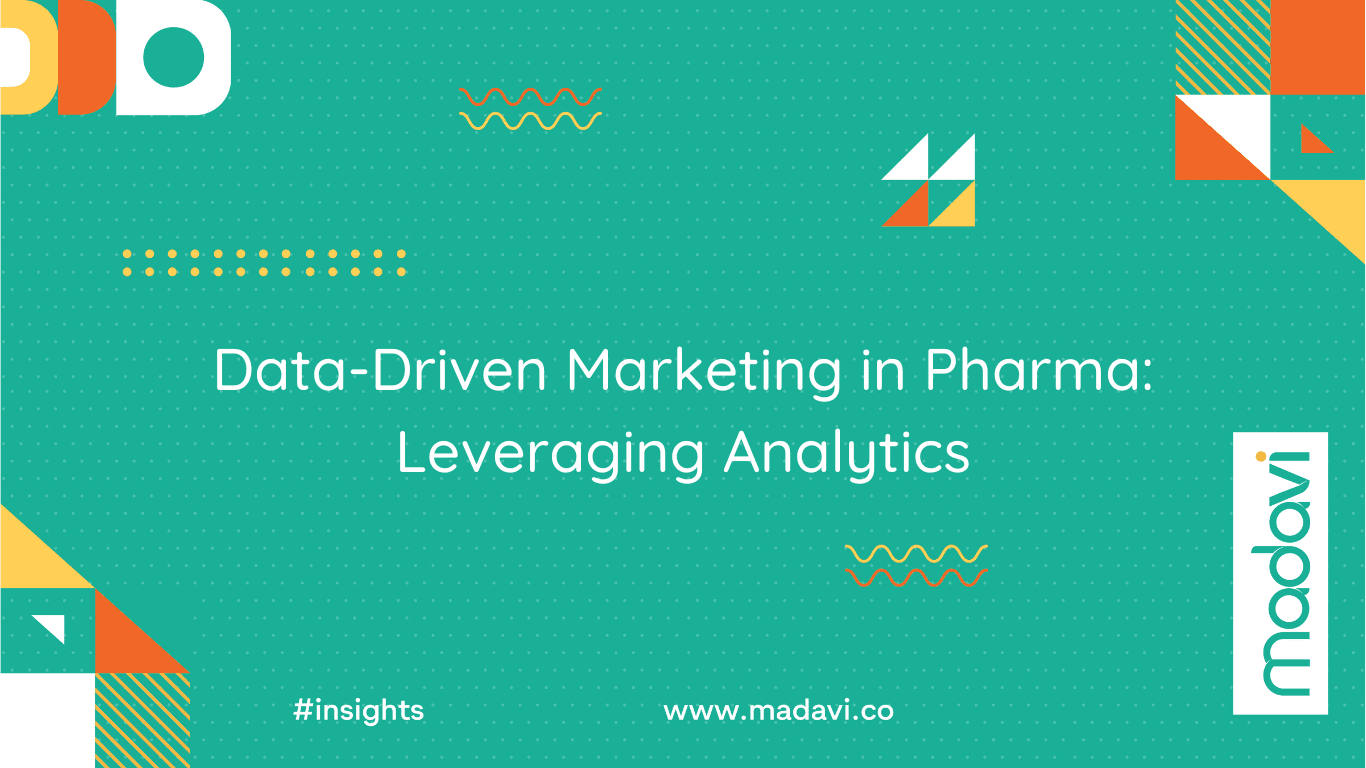Table of Contents
Data-driven marketing has become an essential aspect of the pharma industry. By leveraging data and analytics, pharma companies can make informed decisions and create effective marketing strategies. Data-driven marketing in the pharma industry is about utilizing data to understand the needs of patients and physicians and then using that data to develop targeted campaigns that resonate with them.
With the rise of digital technologies, data-driven marketing has become more critical. Today, patients and physicians have access to a wealth of information, and they expect pharma companies to provide them with relevant and valuable content. By leveraging data, pharma companies can create personalized marketing campaigns that speak directly to the needs of their audience. This can help to build trust and establish long-term relationships with patients and physicians.
Data-driven marketing can also help pharma companies to understand the healthcare landscape better. By analyzing data, pharma companies can identify trends and patterns to help them make informed product development and marketing decisions. This can help ensure that pharma companies deliver the right products to the right people at the right time. Ultimately, data-driven marketing can help to improve patient outcomes and drive business growth in the pharma industry.

The Role of Data in Pharma Marketing
In today’s data-driven world, the pharmaceutical industry is no exception. With the help of data-driven insights, pharma companies can develop effective marketing strategies that optimize sales and marketing efforts, enhance HCP engagement, and understand market dynamics.
Understanding Market Dynamics
Market dynamics play a crucial role in pharma marketing. Pharma companies can better understand market trends, patient needs, and competitor activities using data-driven insights. This information can help them develop marketing strategies tailored to specific market segments and patient populations.
Enhancing HCP Engagement
Engaging healthcare professionals (HCPs) is critical for the success of pharma marketing campaigns. Data-driven insights can help pharma companies understand HCPs’ preferences, needs, and behaviours, which can help them develop targeted marketing campaigns that resonate with HCPs. By providing HCPs with relevant and timely information, pharma companies can build trust, increase brand loyalty, and improve patient outcomes.

Optimizing Sales and Marketing
Data-driven insights can help pharma companies optimize their sales and marketing efforts. By analyzing sales data, pharma companies can identify trends, patterns, and opportunities for growth. This information can help them develop targeted marketing campaigns that reach the right audience at the right time. Additionally, sales force effectiveness can be improved by providing reps with real-time data and analytics that enable them to make informed decisions and engage with HCPs more effectively.
Related Posts:
Leveraging Technology for Marketing in pharma
In the pharmaceutical industry, leveraging technology for marketing has become essential for staying competitive. By incorporating data-driven strategies, pharmaceutical companies can better target their audience, make informed decisions, and interpret complex data effectively.
Artificial Intelligence in Targeting
Artificial intelligence (AI) is crucial in targeting the right audience for pharmaceutical products. AI algorithms can analyze vast amounts of data to identify potential customers, predict their behaviour, and personalize marketing efforts to suit individual needs. This targeted approach enhances the efficiency of marketing campaigns and ensures that the right message reaches the right audience.

Advanced Analytics for Decision Making
Advanced analytics, including machine learning and predictive modelling, enables pharmaceutical companies to make data-driven decisions. Companies can gain valuable insights that inform strategic marketing decisions by analyzing market trends, customer preferences, and sales data. This approach ensures that marketing efforts are aligned with market demands and customer expectations.
Visualization Tools for Data Interpretation
Visualization tools provide a clear and concise way to interpret complex data sets, enabling pharmaceutical marketers to identify patterns, trends, and correlations. Dashboards and visualization platforms allow for the presentation of data in a visually appealing and easily understandable format. This aids in making informed marketing decisions based on comprehensive data analysis.
Related Posts
- Data-Driven Digital Transformation in Pharmaceutical Sales and Marketing
- How Analytics is Powering Pharma Marketing in the New Normal
- Pharmaceutical Marketing: How to Successfully Market in … – Colormatics

Data-Driven Strategies for Patient-Centric Marketing
As the pharmaceutical industry focuses on patient-centricity, data-driven marketing strategies have become increasingly important. By leveraging patient data, clinical research, and real-world evidence, pharma companies can personalize patient interactions, improve patient outcomes, and ultimately deliver better care.
Personalizing Patient Interactions
Personalization is vital to effective patient-centric marketing. By analyzing patient data, pharma companies can gain insights into patient preferences, behaviours, and needs. This allows them to tailor their marketing efforts to each patient, delivering targeted messages and content that resonate with their unique needs and interests.
One effective way to personalize patient interactions is through digital marketing channels. By leveraging data from social media, search engines, and other online platforms, pharma companies can deliver targeted ads and content to patients based on their interests and behaviours.
Utilizing Real-World Evidence
Real-world evidence (RWE) is data collected outside traditional clinical trials, such as electronic health records, claims data, and patient-generated data. By leveraging RWE, pharma companies can gain insights into patient outcomes in real-world settings, allowing them to develop more effective treatments and improve patient outcomes.
Pharma companies can also use RWE to identify patient populations most likely to benefit from their products. By analyzing patient data, pharma companies can identify patient subgroups most likely to respond positively to their products, allowing them to tailor their marketing efforts to these high-value segments.

Improving Patient Outcomes Through Data
By leveraging patient data and clinical research, pharma companies can develop more effective treatments and improve patient outcomes. For example, by analyzing patient data, pharma companies can identify patients at risk of developing certain conditions, allowing them to intervene early and prevent disease onset.
Pharma companies can also use patient data to monitor patient outcomes and adjust treatment plans as needed. By collecting and analyzing real-time patient data, pharma companies can identify trends and patterns in patient outcomes, allowing them to develop more effective treatments and improve patient outcomes over time.
In conclusion, data-driven marketing strategies are essential for effective patient-centric marketing in the pharmaceutical industry. By leveraging patient data, clinical research, and real-world evidence, pharma companies can personalize patient interactions, improve patient outcomes, and ultimately deliver better care.

Operational Excellence in Pharma Marketing
Pharmaceutical companies increasingly adopt data-driven marketing strategies to improve operational efficiency, streamline business processes, and drive growth. A data-driven approach enables companies to optimize their marketing efforts and achieve better results by leveraging insights from customer data.
Streamlining Business Processes
Efficiency is critical to success in the pharmaceutical industry, and data-driven marketing can help companies streamline their business processes and workflows. Companies can reduce costs and improve their bottom line by automating routine tasks and using data to inform decisions. For example, closed-loop marketing allows companies to track the effectiveness of their marketing campaigns and adjust their strategies in real time, leading to more efficient and effective marketing efforts.
Building a Data-Driven Culture
Companies must create a culture that values data and analytics to leverage the benefits of data-driven marketing fully. This requires a commitment to data quality, accuracy, and investment in the tools and technologies needed to collect, analyze, and act on data insights. By building a data-driven culture, companies can make better decisions, improve their marketing efforts, and drive growth.
Agility in Research and Development
Agility is critical in the pharmaceutical industry, where companies must constantly adapt to changing market conditions and regulatory requirements. Data-driven marketing can help companies stay agile by providing real-time customer needs and preferences insights. By using data to inform their research and development efforts, companies can develop new products and services that better meet the needs of their customers.

Related Posts:
Challenges and Ethical Considerations
Data-driven marketing in pharma presents several challenges and ethical considerations that must be addressed to ensure the trust of stakeholders and caregivers. The most pressing challenges include data privacy and security and building stakeholder trust.
Data Privacy and Security
Data privacy and security are critical concerns regarding data-driven marketing in pharma. With the increasing data collection volume, protecting sensitive information from unauthorized access, use, and disclosure is essential. Companies must implement robust data management systems that comply with data protection laws and regulations to safeguard data privacy and security.
One way to ensure data privacy and security is to anonymize and aggregate data, which can help protect patient identities and prevent data breaches. Additionally, companies must ensure that their data management systems are regularly audited and updated to ensure compliance with evolving data protection laws and regulations.
Building Trust with Stakeholders
Building trust with stakeholders is essential for the success of data-driven marketing in pharma. Companies must establish strong relationships with stakeholders, including patients, caregivers, healthcare providers, and regulatory bodies, to ensure they understand the benefits of data-driven marketing and are willing to participate.
Companies must be transparent about collecting, using, and sharing data to build stakeholder trust. They must also ensure that patients and caregivers have control over their data and can opt out of data collection if they choose to do so. Additionally, companies must establish partnerships with healthcare providers and regulatory bodies to ensure that data-driven marketing is conducted ethically and complies with relevant laws and regulations.

In conclusion, data-driven marketing in pharma presents several challenges and ethical considerations that must be addressed to ensure the trust of stakeholders and caregivers. Companies must implement robust data management systems that comply with data protection laws and regulations to safeguard data privacy and security. They must also establish strong relationships with stakeholders and be transparent about collecting, using, and sharing data to build trust. Companies can successfully leverage data-driven marketing to improve patient outcomes and advance healthcare by addressing these challenges and ethical considerations.







